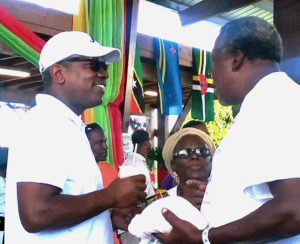
Fifteen months after the devastation wrought by Hurricanes Irma and Maria the farmers of western St. Thomas are taking up an old, familiar cry; there’s not enough water to sustain their crops.
Those longstanding concerns were heard over the Martin Luther King Day weekend during the 22nd Rastafari Cultural and Agricultural Fair.
A sustainable water supply was on the mind of Eldritch Thomas, president of We Grow Food, Inc., a local collective serving St. Thomas’ farming community. It was the kind of concern that topped his list of things the government could do, but didn’t get around to after the storms.
We Grow Food has served farmers by advocating for their needs and raising awareness about the importance of having a locally, sustainable supply of fresh food for 25 years. Through the years, Thomas said, government has fallen short in meeting those needs.
“Our main water system in our area here, that supplies water, is down for the last three months,“ Thomas said.
It’s a problem that keeps local agriculture from reaching its potential, he said. Some of the more successful farmers agree that water is a pressing need.
Charles and Joseph Leonard spoke about their ability to work two and a half acres over the years. The water supply has been so low, of late that Charles Leonard took measures of his own.
Without enough water, he said, all efforts to clear and plant his acreage could at best yield fifty percent.
“You may as well give each of us a quarter acre,” Leonard said.

Using his background in engineering, Leonard said he was able to improve his water supply without relying on the government. The purchase of a $1,000 water pump, placed near the dam built by the Department of Agriculture, allowed Leonard to fill his cistern with 5,000 gallons. That amount, he said, would help him plant cucumbers and eggplant for the programs supplying local supermarkets with half of the available land. The other half, he said, would go towards crops he could sell on his own, wholesale.
But 5,000 gallons doesn’t go far, the farmer said. Two weeks from now it will be gone.
Both Thomas and Leonard said the DOA has tried to relieve the farmer’s water woes. In 2011, under the administration of former Gov. John de Jongh, the then-Agriculture Commissioner Louis Petersen built a 60,000 gallon cistern for use by Bordeaux Farmers.
But as time passed, parts of the water delivery system grew old and failed, Leonard said. Replacement parts are needed.
Part of the problem, Thomas said, is there was no disaster mitigation plan in place for local agriculture. When Irma and Maria hit, he said, an emergency response could not be found. Officials from the U.S. Department of Agriculture showed up and held a workshop to familiarize farmers with the EWPP program. The Emergency Watershed Protection Program, “also can help relieve imminent threats to life and property caused by flood, fires and other natural disasters that impair a watershed,” according to a USDA statement issued after the storms.
Once the workshop was held and farmers walked through the application process, USDA officials promised a response within two or three weeks.
Now, Thomas said, three or four months have passed without the promised response. The current partial federal shutdown most likely is not helping things, he said.
But the continued production of local fruits and vegetables must go on, he said.
“Definitely, our biggest challenge is water,” Thomas said.
The We Grow Food leader said he would like to see a local developed that would provide insurance for farmers to work alongside DOA officials in construction areas to repair and improve the available infrastructure.
“The government only thinks one way – an appropriation, and then hire some contractors to do the work. I would like to see us develop a comprehensive plan where we could assist in increasing the availability of water,” Thomas said.





